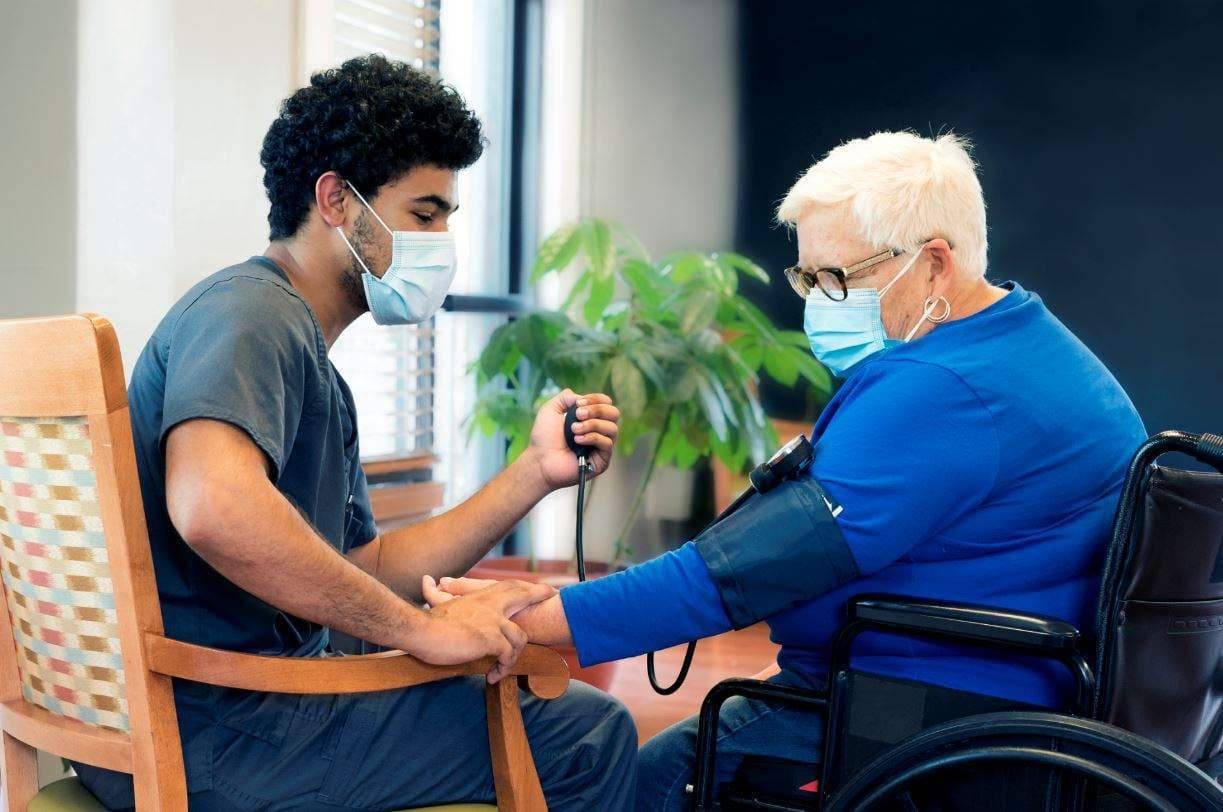Home Health Care: Personalized Support Right at Home
Home health care services are all about meeting patients’ needs in the comfort of their own
homes. Unlike hospitals or care facilities, this approach gives people the chance to receive care
without leaving their familiar surroundings.
It’s a personalized way to enhance quality of life—whether through medical care, therapy, or
daily support. From skilled nursing to home health aides, these services help people stay
independent, improve their health, and give peace of mind to both patients and their families.
Skilled Nursing Services in Home Health Care
What is Skilled Nursing?
Skilled nursing is one of the most important services in home health care. It provides medical
care at home for people who need professional attention. Skilled nurses are highly trained and
handle complex conditions, wound care, and monitoring chronic illnesses. It’s like getting
hospital-level care, but without the stress of constant trips to the hospital.
Services Offered by Skilled Nurses
Skilled nursing covers a wide range of medical needs, including:
● Administering medications at the right times
● Providing IV therapy and managing feeding tubes
● Helping with post-surgery recovery
Nurses also check vital signs, perform routine health checks, and teach patients and their
families how to manage ongoing medical conditions.
WhyIt Matters
One big benefit? It helps keep patients out of the hospital. Nurses can catch problems early and
provide treatment right at home. That means fewer hospital stays and a better experience for
everyone involved. Plus, families get the comfort of knowing their loved ones are getting expert
care without leaving home.
Physical and Occupational Therapy at Home
What’s the Purpose?
Physical and occupational therapy at home helps people regain strength, mobility, and
independence. Physical therapy focuses on exercises and techniques that improve movement
and balance. Occupational therapy, on the other hand, helps people perform daily tasks more
easily and safely, even with physical limitations.
What Kinds of Therapy Are Offered?
Therapists create personalized plans based on each patient’s needs. This could include:
● Exercises to strengthen muscles and improve flexibility (physical therapy)
● Balance training and learning how to use assistive devices like walkers (occupational
therapy)
These therapies are critical for people recovering from injuries, surgeries, or managing chronic
conditions like arthritis.
What’s the Goal?
The main goal? To help people stay as independent as possible. Therapy helps reduce the risk
of falls, makes daily activities easier, and boosts confidence. Because the therapy is done at
home, many patients recover faster and feel more optimistic about their progress.
Speech Therapy for Home Health Patients
Why is Speech Therapy Important?
Speech therapy helps people who struggle with speaking or swallowing, often due to conditions
like stroke or neurological disorders. Working with a speech therapist at home allows patients to
practice in a relaxed environment, helping them regain confidence faster.
Conditions Treated Include:
● Stroke recovery: Helping regain lost speech and language skills
● Parkinson’s disease: Managing speech clarity and swallowing difficulties
● Speech disorders: Conditions like aphasia, dysarthria, or apraxia, which affect
communication
How does it Work?
Speech therapists use tailored strategies like vocal exercises to improve clarity or cognitive
training to enhance memory and attention. Swallowing therapy helps patients eat safely,
preventing choking. These therapies allow patients to reconnect with daily routines and their
loved ones in a meaningful way.
Home Health Aides: Helping with Daily Tasks
Who are Home Health Aides?
Home health aides assist patients with day-to-day activities, offering essential help to those who
struggle due to age, illness, or disability. Their goal? To keep people comfortable, independent,
and safe in their own homes.
What Do They Do?
Aides offer help with:
● Bathing and grooming
● Preparing meals
● Reminding patients to take medications
● Helping with mobility
These tasks might seem simple, but they are crucial in helping patients live with dignity and
independence.
Why Families Love Home Health Aides
Home health aides provide much more than just physical support—they offer companionship.
They reduce feelings of isolation and bring comfort to families, knowing their loved ones are in
good hands. For many caregivers, aides also provide much-needed relief, preventing burnout.
Medical Social Work: Supporting Patients and Families
What Do Social Workers Do?
Medical social workers are a key part of the home healthcare team. They help patients and
families cope with emotional, financial, and social challenges related to health care. They also
help create care plans that meet each patient’s unique needs.
Support Offered
Social workers offer:
● Emotional counseling for patients dealing with health changes
● Connections to community resources like support groups and transportation
● Help navigating insurance and finding financial aid
Their job is to make sure families can focus on their loved ones without being overwhelmed by
healthcare logistics.
Why It Matters to Families
Social workers reduce the physical and emotional strain on caregivers by helping them access
support services and plan for the future. They also provide respite care options, so families get
a break when needed. Their holistic approach makes home health care easier and less stressful
for everyone involved.
Conclusion:
Home health care provides skilled nursing, therapy, home health aides, and medical social work
services that enhance patients’ well-being while allowing them to stay in their homes. Whether
you’re looking for expert medical care or daily support, these services offer compassionate,
personalized care designed to improve your quality of life. Refer to this article to know non-medical benefits of In-Home Care.
Need more info? Reach out to learn how home health care can benefit you and your family.












